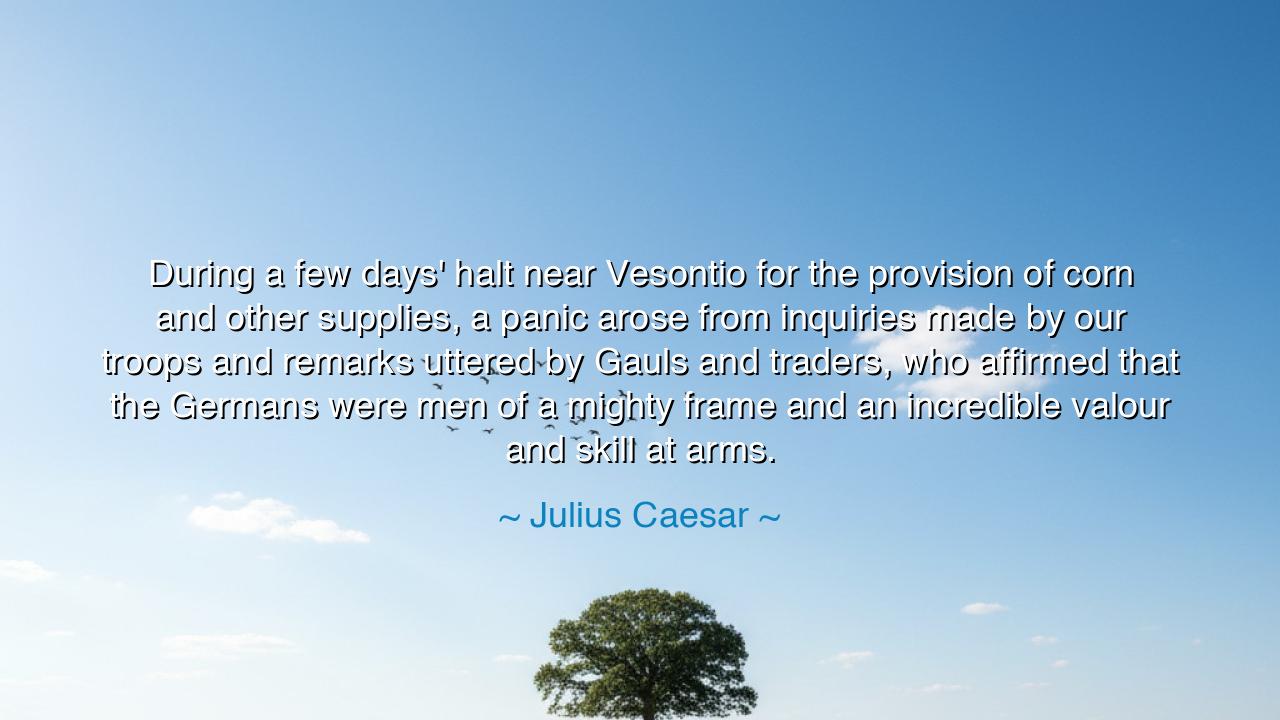
During a few days' halt near Vesontio for the provision of corn
During a few days' halt near Vesontio for the provision of corn and other supplies, a panic arose from inquiries made by our troops and remarks uttered by Gauls and traders, who affirmed that the Germans were men of a mighty frame and an incredible valour and skill at arms.






Hear, O listeners, the words of Julius Caesar, commander and chronicler of his own wars: “During a few days’ halt near Vesontio for the provision of corn and other supplies, a panic arose from inquiries made by our troops and remarks uttered by Gauls and traders, who affirmed that the Germans were men of a mighty frame and an incredible valour and skill at arms.” In this passage, Caesar records not only the movements of an army but the stirrings of the human spirit, which is so easily shaken by tales of fear.
The meaning is plain, yet profound: soldiers, hardened in battle, falter not always before the enemy’s sword, but before the shadow of his reputation. The panic of Caesar’s men did not spring from wounds or losses; it was born of whispers, of rumors spread by the Gauls and traders. The Germans—men not yet seen—were described as giants, fierce beyond measure, unmatched in courage and skill. The imagination, once inflamed by dread, became more terrible than reality itself. Thus Caesar reveals the ancient truth: fear of the unknown is a sharper weapon than steel.
The origin of this tale lies in Caesar’s Commentarii de Bello Gallico, where he sought not only to recount events but to shape opinion in Rome. By describing the panic of his men, he magnified the might of the Germans, and by conquering them later, he magnified his own glory. Yet even within this purpose, we glimpse a lesson for all ages: armies and nations are not only tested by enemies without, but by the voices that stir doubts within.
History gives us many echoes of this moment. When Alexander’s troops, weary and far from home, heard tales of the Indian elephants, they trembled, for they had never seen beasts of such scale. Yet when the battle was joined, the elephants fell as all creatures do, and the Macedonians triumphed. The terror they first felt was greater than the danger itself. In the same way, Caesar’s legionaries at Vesontio were paralyzed by rumor until their general’s voice restored courage. He reminded them of their victories, shamed their weakness, and turned their panic into resolve.
This truth resounds not only in war, but in the battles of life. How often do men and women falter, not because the task before them is impossible, but because they have magnified its terror in their own minds? A challenge looms, whispered about as insurmountable, and suddenly the heart quakes before even attempting. Yet when action is taken, the task proves conquerable, and the shadow shrinks before the light of courage. The Germans of Caesar’s tale stand as symbols of all fears exaggerated by rumor and imagination.
The lesson, O listener, is clear: beware the whispers of fear. Do not allow the words of others, or the doubts of your own heart, to magnify challenges into monsters. Judge by truth, not rumor; act with courage, not trembling. For even the mightiest foe is but flesh and blood, and even the darkest task can be divided into steps. Caesar’s men learned that the true battle is fought first in the mind, and only afterward with the sword.
Therefore, in practice, when fear grips you, recall this ancient tale. Name your panic for what it is—an illusion born of stories, not yet of reality. Strengthen your spirit with remembrance of past victories, as Caesar did for his troops. Step forward into action, for fear cannot long endure the presence of courage. In this way, you will master not only the battles before you but also the greater battle within, and your life will stand as proof that no rumor, however dreadful, can overcome the heart that endures.






AAdministratorAdministrator
Welcome, honored guests. Please leave a comment, we will respond soon